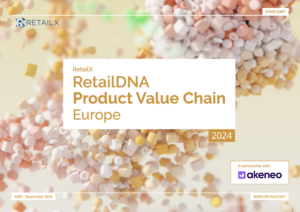The newly published RetailDNA Product Value Chain Europe 2024 report looks at how fashion brand Seasalt showcases the clothing, accessories and footwear that it sells through detailed product information and by enabling previous purchasers to share their opinions of products.
Fashion brand Seasalt’s roots go back to 1981, when founder Don Chadwick opened his first shop in Penzance, selling traditional workwear to farmers, fishermen and artists. This inspired his sons Neil, Leigh and David to create a clothing brand – Seasalt.
This family business now sells online and through more than 70 Seasalt shops in the UK and Ireland. In the year to January 2024, it reported pre-tax profits of £6.8mn on sales of £133mn (+12% on the previous year). Its direct-to-customer sales accounted for 79% of group revenue, of which, 49% is instore and 51% online.
Good product information is important in the Product Value Chain, where it is rewarded through the margin KPI. Seasalt offers in-depth product details about its clothing, from materials to features and care details. In its product details, Seasalt links to a size guide and to its ethical trading policy.
Shoppers can see what other customers thought through reviews and ratings, something that is rewarded through the business operating model KPI. The information comes from a detailed questionnaire when shoppers opt to write a review. This approach recognises the way in which retailers optimise process flows and capabilities, reflected in the way that access to information helps shoppers to move through their shopping journey, towards the checkout.
Seasalt shares product reviews, with customers asked to score products for quality and whether they would recommend them. Shoppers can search and filter reviews and then share them on Facebook, X (Twitter) or LinkedIn. Taken individually, these are small steps that may add up to significant gains for the brand, as assessed through the margin KPI. Another selling decision that is reflected in the margin KPI is the decision to deliver at a profit. Standard delivery is free on orders over £60, while shoppers can alternatively choose to pay for a premium service or to collect an item from a shop.
The brand flags promotions through multi-buy options and through a dedicated sale section of its website. Shoppers can also filter purchases by their budget, ensuring that more shoppers find items they can afford. This approach of flagging up discounts is reflected through the conserve KPI, recognising the importance of selling as many products as possible at the best possible price in order to ensure that lines sell out profitably.
This Seasalt profile is one of eight in the brand new RetailDNA Product Value Chain Europe 2024 report.
The report explores how retailers invest in products before displaying and selling them in a way that adds value and generates profits that can be reinvested.
Our analysis sets out how this happens and enable companies to benchmark themselves against the leaders in their field.
Stay informed
Our editor carefully curates two newsletters a week filled with up-to-date news, analysis and research, click here to subscribe to the FREE newsletter sent straight to your inbox and why not follow us on LinkedIn to receive the latest updates on our research and analysis.










